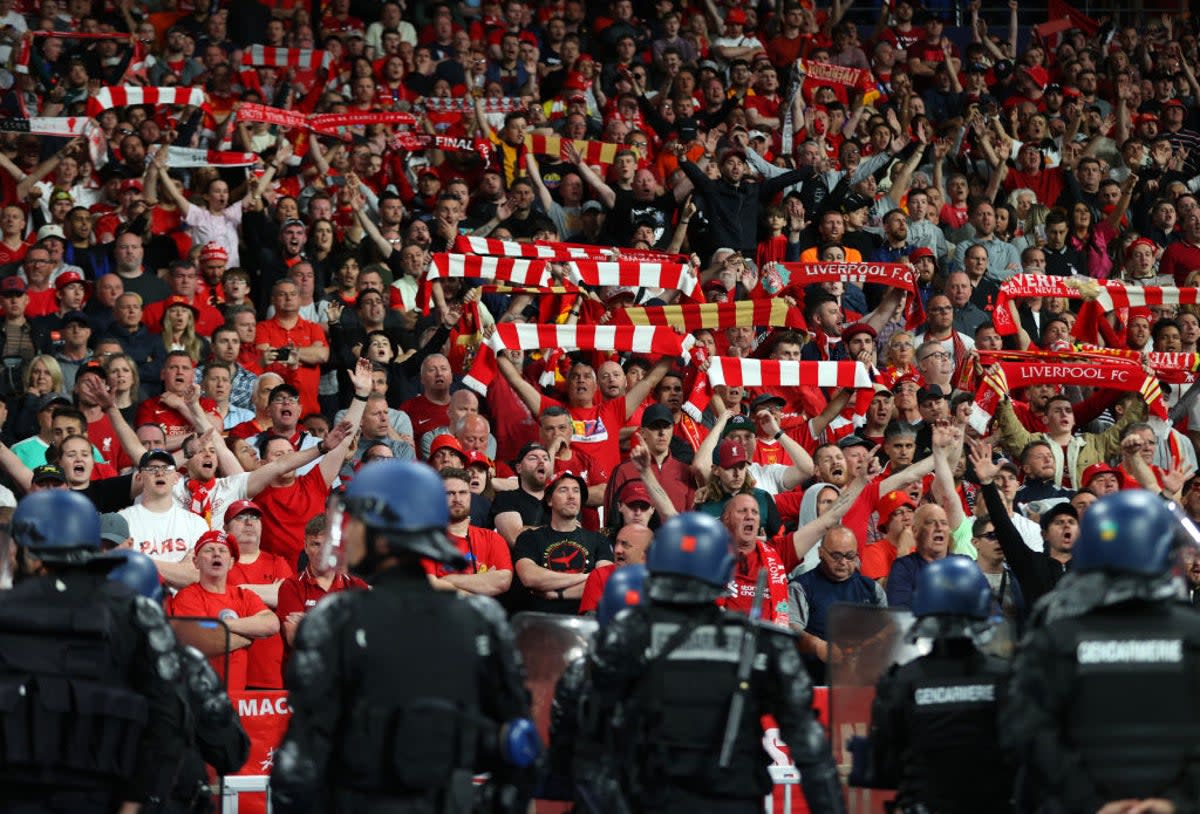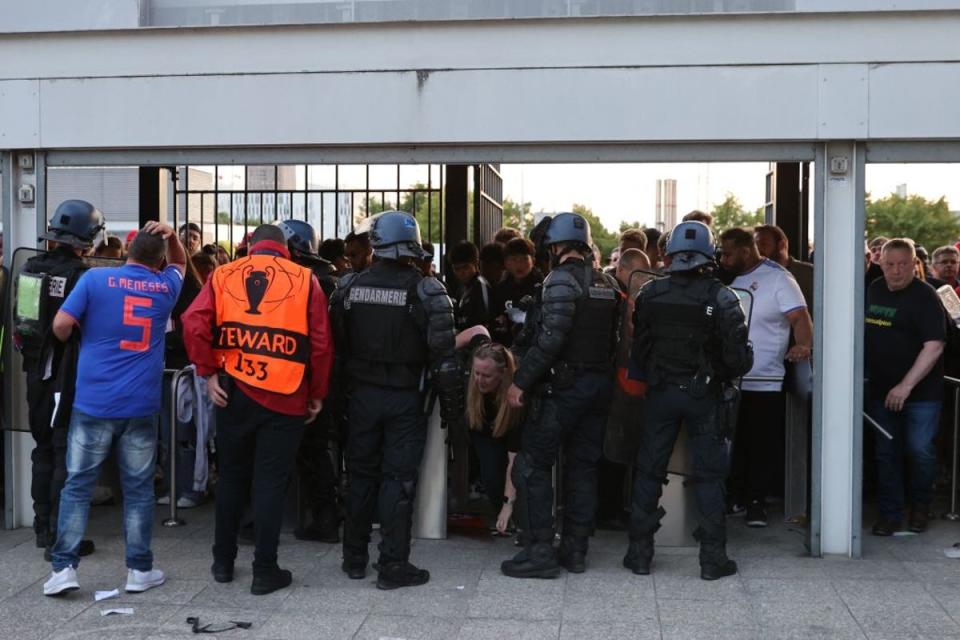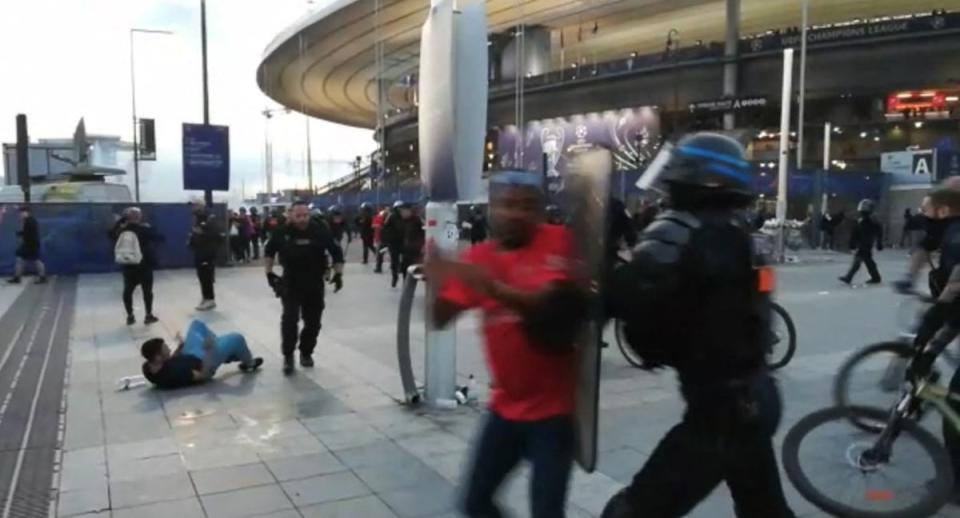French ministry accused of ‘prejudice against Liverpool fans’ following Champions League final police tactics

The French ministry of the interior have been accused of using stereotypes about Liverpool supporters to deflect from failures of organisation at the 2022 Champions League final in Paris, by Europe’s primary supporters’ association.
French minister Gerald Darmanin had blamed the fiasco on “thousands of British ‘supporters’ without tickets or with counterfeit tickets”, but this has been dismissed by Football Supporters Europe, who were on the ground at the game, and put the responsibility purely on the authorities.
“There is a cheap, very old prejudice against Liverpool fans, and I think it has been used for political gain by the French government,” said Ronan Evain, executive director of the organisation.
“What we saw on the ground is remarkably behaved and calm Liverpool fans given the circumstances.”
The Independent has contacted the French ministry of the interior for comment, and is still awaiting a response. They are set to meet with Uefa, the local authorities, police, the final organisers and the French Football Federation on Monday morning, in order to conduct a full review of Saturday’s debacle. The investigation will not just be important for what happened but also what next, as many football figures were staggered that a marquee final in a major European country could be delayed for 35 minutes due to poor crowd management. It is also the third Uefa final in a year to see problems, after last July's Euro 2020 showpiece at Wembley and the Europa League final in Seville two weeks ago. Some similar issues to both those games have already been blamed.
There is a relief among virtually all involved that the evening avoided true disaster, as numerous testimonies have told of crushes that saw people having to escape before the game, fans needlessly pepper-sprayed and tear-gassed, and then groups of supporters later attacked and robbed by waiting gangs after the match. There were even accounts of people being “chased down alleyways with corkscrews.”
The evening has only added to big questions in France about their policing of football, with many fan representatives long predicting that something like this would happen, as well as provoking debate about the staging of the Olympics in Paris in August 2024.
The Independent has spoken to numerous people who attended the Stade de France on the day to try and ascertain how the debacle unfolded, and it now appears that the primary issue was the absolute failure of authorities to adapt to a strike by RER B train workers on the day of the final. This created a “bottleneck”, and then a “domino effect”.
The strike saw the main station closed, which initially meant that fans due to sit in the Liverpool end were funnelled through a secondary route at RER D. That only has four corridors, whereas the usual entry point has 12.
The problem was that nobody changed the plan, which meant thousands of supporters were bottlenecked into this one area, immediately creating huge congestion three hours before the game.
“We got off the train at about 6.30pm and made our way towards the ground which involved a motorway underpass,” explains Phil Blundell, a regular Liverpool match-goer. “We were funnelled through the underpass slowly, up a ramp maybe 200 yards past the stairs up, but it was a slow-moving bottleneck.”
Other fans who have declined to be named have similarly told the Independent there was already considerable physical discomfort at that point, with individuals literally trying to escape for air.
The situation was all the more needless given that the space leading up from RER B was clear. It was only after an hour that authorities realised this, but by then it was too late. The congestion was too great, which supporters and the FSE say led to “panic attacks” and “some scary situations”.

Several sources explain it was at this point that the decision was made to stop the control, in order to ease the flow of people.
“The bottleneck was a ticket check that was abandoned maybe 7.30pm,” Blundell says. It was after this that many supporters without tickets - with a considerable proportion cited to be local youths - managed to gain access to the perimeter. As one source noted, “chaos brings chaos”, and “bad actors”.
“Yes there were some fake tickets, some fake accreditations, and some touts,” Evain explains, “but this is like any final.”
The key to mitigating it is proper organisation, which was badly lacking here. Many who attended the Euro 2016 final at the same stadium pointed to the rings of steel around the Stade de France and huge perimeter, features that were also lacking on Saturday.
There was a lack of stewards and volunteers, as well as signage, which led to many fans asking FSE workers for advice. Worse, there was a complete lack of communication. None of the announcements inside the stadium were shared with those outside, with fans only learning through their phones. Some supporters already inside had to come to the fence to inform others that the game was delayed. This is seen as key to calming people down. Beyond that, fans simply didn't know where to go.
While there has been focus on how there were comparatively few problems at the Madrid end of the Stade de France, the geography at this side of the stadium is not as problematic, but still saw “massive queues” with hundreds of Spanish supporters missing kick-off.
One Liverpool supporter who declined to be named said: “I would reiterate that there were a small amount of Liverpool fans with fake tickets - whether that’s their fault or the person who sold them to them - but every time a fan climbed up a fence, they were shouted down, even dragged down.”
In other words, there was considerable self-policing, something which goes against Darmanin’s statement. It was needed, as the official policing was also lacking, or unhelpfully aggressive.
“It is hard to connect two positions,” Evain says. “How does a high number of fake tickets lead to congestion around the stadium two hours before? That doesn’t add up. Yes, there were people trying to enter, trying to jump the turnstiles. It was very close to Wembley 2021 [the Euro 2020 final] in that regard. Police are not necessarily prepared to respond to this, because it is very different to the habits and behaviour of normal fans.”
Blundell paints a similar picture.
“The main problem throughout, for me, was locals deciding they were getting in. The majority of people vaulting walls were them. In Madrid [in 2019], I think I did four ticket checks including the turnstile. Here, no one checked until the turnstile. The ultra-violet pen used to determine the authenticity of a ticket wasn’t used. It was impossible for them to quantify fake tickets as they didn’t check them.”
The overzealous responses of the police are seen as all the more surprising and unwarranted given the fan zone earlier in the day had passed off so safely, with just one minor incident at a bar.

The police have also been criticised for an intimidating cordon around the Liverpool end at full-time, given there were was no trouble during the game, and then being absent outside the Stade de France after the game.
It was here there was the greatest potential for real violence, given there are numerous accounts of fans being attacked.
“Post-match last night was the scariest I’ve ever experienced,” pundit and former Liverpool player Jim Beglin posted on social media. “Organised gangs set about mugging departing fans. We ran a gauntlet of thuggery on our way to the Metro. Not a police officer in sight. Witnessed so many ambush attacks on unsuspecting attendees.”
The wife of midfielder Thiago Alcantara said similar: “Constantly being threatened by bands of robbers, that were trying to assault us and slipped into the stadium without a ticket. For that many supporters were left out of the game triggering avalanches of people.”
Some at the top end of the sport and in other national associations have meanwhile raised concerns about the French federation’s approach to fans, as well as the lack of Uefa staff and volunteers at such events.
It is for all these reasons that the FSE say Darmanin’s statement was a “cheap political move to deflect responsibility”.
Uefa sources insist every aspect of the final will be reviewed.

